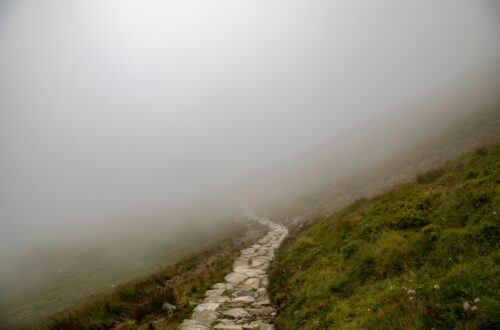“Oh she’ll never forget (the things) she saw that she loved so much.”
That’s the comment left on a Youtube video of one time when I shared my story. You know what they say: Never read the comments.
I know the attitude behind the comment was one of condescension. It’s an exaggerated eye roll and a sigh that says, ‘Suuuuuure she’s free.’
It’s the voice of shame so many women hear. “You’ll never be free. You’ll never escape. You can’t run. I will find you.”
Can you really forget pornography?
It’s a common question, and I completely understand why. There was a time in my journey when I felt like I couldn’t get rid of the images stored in my mind. They would recall at the absolute worst times.
I’d sit down to pray, close my eyes and there they were.
I’d be sitting in Bible college class, and it’s like I couldn’t get them out of my head. The videos. The pictures. The sounds. It felt cruel and unfair. I didn’t want this, so why couldn’t I even stop remembering it?
I share this in my book, Beggar’s Daughter. This is one of the things I feel makes pornography addiction so unique. You can’t cut off from it. It’s not possible.
If you struggle with alcohol, I can take your alcohol away.
If you struggle with substances, I can control your access.
When it comes to pornography, you cannot “cut it out.” Even if you aren’t consuming new content, you have reserves of old content stored in your mind.
When you’re in the middle of that, it’s hard to believe you can ever be free of that. The best version of freedom you can think of is a life on the run, constantly dodging errant thoughts and memories.
And sadly, I feel this is a version of freedom perhaps unwittingly promoted in churches. Even though the Bible says it right there in plain black and white that our minds can be renewed, we have a really really hard time grasping the concept of victory in the battlefield of the mind. Victory, as we tell it, looks like holding a remote control and constantly changing the channel back. It looks like “bouncing your eyes.”
It looks like fearful avoidance.
I’m here to tell you, there is a better version of freedom out there. A version in which the images, videos, and sounds stop chasing you and lie dormant, dust-covered in some attic crawl space somewhere. They’re there. But you have to go looking for them.
Instead of fearful avoidance there is a freedom and awareness.
How do you get there? Well, I wish I had a simple recipe for that, and perhaps someone somewhere does. I don’t. But what I do have is this promise from Romans 12:2: that our minds can be renewed.
Science supports this. Entire books have been written about the phenomenon of neuroplasticity which is essentially how the brain can rewire itself. Programs can be rewritten.
I recently read a study on learned helplessness. Learned helplessness is the psychological term for when we resign ourselves to our fate. When we believe that this is just the way things are and there is no way we can change it.
My husband and I saw this while in New Zealand. On one of our trips, we drove by farms of deer. Having lived quite some time in Maryland, and having a brother who hunts, I know deer are capable of jumping quite high. So I found it interesting that these herds were quite content to stay inside their enclosures with fences no more than four foot tall.
Do you know why the deer don’t leave? our driver asked.
Because they were raised behind higher fences that they couldn’t jump over. So they gave up trying.
Learned helpessness.
Now that the deer were turned out to pasture, they didn’t realize they could clear the fence.
In this study I read, animals with learned helplessness were able to overcome it by accomplishing smaller tasks.
Our brains can be rewired.
Perhaps a lot of our feelings of defeat come when we feel like God has some sort of eraser and we just assume that one day we’re going to wake up and forget who we are, what we did, what we’ve seen- all of it.
While that would be lovely, especially when it comes to areas of our lives that carry so much shame, that’s not how it works.
What are some small steps you can take to forget pornography?
1- Take thoughts captive.
In college, the strategy discussed was “change the channel.” When lustful thoughts come, we were supposed to change the channel. Think on things that are good, lovely, honest… (Philippians 4:8). In hindsight, it’s similar to how I was taught to handle emotions growing up. Just ignore them.
I think the hope is if we just ignore them, they will go away. But in my own journey, I found it far more helpful and powerful to actually call the errant thoughts out.
Shame tells you to run. Shame tells you to hide. Ignorance and silence are hallmarks of shame.
But grace calls us into the light and into connection and community.
So instead of frantically reaching for a mental remote to “change the channel,” exercise 2 Corinthians 10:5 and start waging war on these thoughts. Stop running scared and start taking prisoners.
What does this look like? The next time your memory recalls a video, photo, or sound, stop what you’re doing and call it out in prayer. Name it. “God I am having this thought right now about ((insert descriptor)) and I am taking it captive and I am giving it to you.”
What are you doing? You are retraining your brain. You are telling it, “This pathway is now closed. It’s off limits.”
2- Heal the root.
So often an addiction to pornography is meeting a non sexual need. It might be how you cope with stress. It might be how you process trauma. It might be how you find your sense of love and belonging.
If you don’t know what might be triggering your struggle, you can check out this free e course.
This is why ignorance isn’t always helpful, because the struggle is itself part of a bigger struggle. The book Unwanted is a phenomenal resource in this exact area. Shame will tell you that you are a bad person for having this struggle and that if you could just have some self control, you would be able to get out of this. The reality is, freedom so often looks like healing.
If you don’t know what might be underlying your struggle with pornography, or if you have an idea but no idea where to start, I highly recommend talking to a licensed Christian counselor.
3- Celebrate small victories.
Remember, learned helplessness can be overcome as you realize you can do hard things. If you catch yourself looking at pornography but close the moment you feel convicted, that’s a victory. On paper it may look like a failure, but you were responsive. You got out of there. That’s growth.
You made it a week without watching porn when you used to watch it for hours a day? That’s a victory. Have you won the war yet? No, but you are starting to gain ground.
As you celebrate those little steps, you will find yourself coming out from under the grip of shame and will find yourself rejoicing in freedom. As you do that, the things you used to watch lose their power.
Yes, it takes time. It takes time for any memory to fade.
There is no magic eraser option when it comes to forgetting pornography, but I am here to tell you that you absolutely can.
To that woman in the comments, I don’t remember the scenes. I don’t recall them. Could I? Sure. In the same way I might be able to recall a sixth grade science project. If I sat and thought about it, I absolutely could, but I don’t want to and I don’t need to. And, to me, that is freedom.






